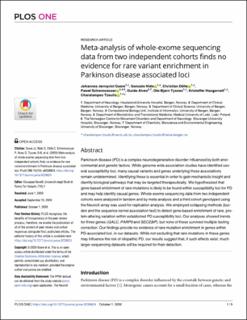| dc.contributor.author | Gaare, Johannes Jernqvist | |
| dc.contributor.author | Sanchez Nido, Gonzalo | |
| dc.contributor.author | Dölle, Christian | |
| dc.contributor.author | Sztromwasser, Pawel Szymon | |
| dc.contributor.author | Alves, Guido Werner | |
| dc.contributor.author | Tysnes, Ole-Bjørn | |
| dc.contributor.author | Haugarvoll, Kristoffer | |
| dc.contributor.author | Tzoulis, Charalampos | |
| dc.date.accessioned | 2023-02-09T11:37:10Z | |
| dc.date.available | 2023-02-09T11:37:10Z | |
| dc.date.created | 2020-11-11T20:15:16Z | |
| dc.date.issued | 2020-10 | |
| dc.identifier.citation | Gaare, J.J., Nido, G., Dölle, C., Sztromwasser,, P., Alves, G., Tysnes, O-B., Haugarvoll, K., Tzoulis, C. (2020) Meta-analysis of whole-exome sequencing data from two independent cohorts finds no evidence for rare variant enrichment in Parkinson disease associated loci. PLOS ONE, 15(10), e0239824 , 1-9. | en_US |
| dc.identifier.issn | 1932-6203 | |
| dc.identifier.uri | https://hdl.handle.net/11250/3049634 | |
| dc.description.abstract | Parkinson disease (PD) is a complex neurodegenerative disorder influenced by both environmental and genetic factors. While genome wide association studies have identified several susceptibility loci, many causal variants and genes underlying these associations remain undetermined. Identifying these is essential in order to gain mechanistic insight and identify biological pathways that may be targeted therapeutically. We hypothesized that gene-based enrichment of rare mutations is likely to be found within susceptibility loci for PD and may help identify causal genes. Whole-exome sequencing data from two independent cohorts were analyzed in tandem and by meta-analysis and a third cohort genotyped using the NeuroX-array was used for replication analysis. We employed collapsing methods (burden and the sequence kernel association test) to detect gene-based enrichment of rare, protein-altering variation within established PD susceptibility loci. Our analyses showed trends for three genes (GALC, PARP9 and SEC23IP), but none of these survived multiple testing correction. Our findings provide no evidence of rare mutation enrichment in genes within PD-associated loci, in our datasets. While not excluding that rare mutations in these genes may influence the risk of idiopathic PD, our results suggest that, if such effects exist, much larger sequencing datasets will be required for their detection. | en_US |
| dc.language.iso | eng | en_US |
| dc.publisher | Public Library of Science | en_US |
| dc.rights | Navngivelse 4.0 Internasjonal | * |
| dc.rights.uri | http://creativecommons.org/licenses/by/4.0/deed.no | * |
| dc.subject | nevrologi | en_US |
| dc.subject | Parkinson | en_US |
| dc.title | Meta-analysis of whole-exome sequencing data from two independent cohorts finds no evidence for rare variant enrichment in Parkinson disease associated loci | en_US |
| dc.type | Peer reviewed | en_US |
| dc.type | Journal article | en_US |
| dc.description.version | publishedVersion | en_US |
| dc.rights.holder | © 2020 Gaare et al. | en_US |
| dc.subject.nsi | VDP::Medisinske Fag: 700::Klinisk medisinske fag: 750::Nevrologi: 752 | en_US |
| dc.source.pagenumber | 1-9 | en_US |
| dc.source.volume | 15 | en_US |
| dc.source.journal | PLOS ONE | en_US |
| dc.source.issue | 10 | en_US |
| dc.identifier.doi | 10.1371/journal.pone.0239824 | |
| dc.identifier.cristin | 1847151 | |
| dc.source.articlenumber | e0239824 | en_US |
| cristin.ispublished | true | |
| cristin.fulltext | original | |
| cristin.qualitycode | 1 | |

